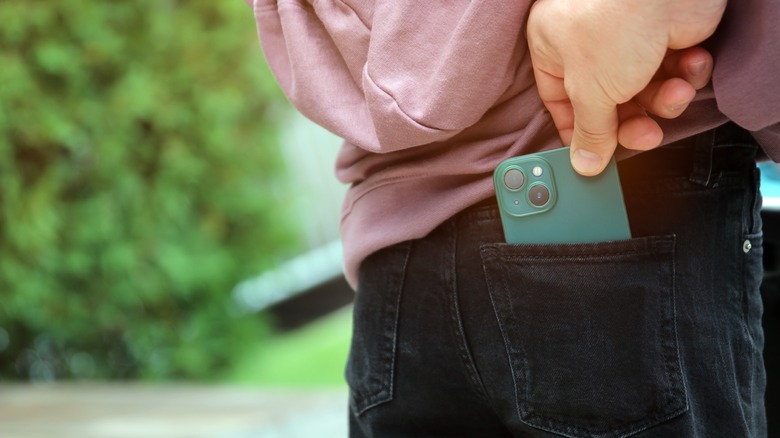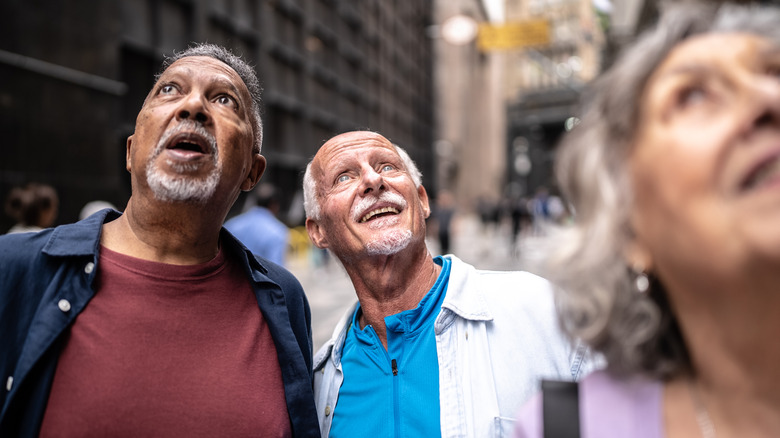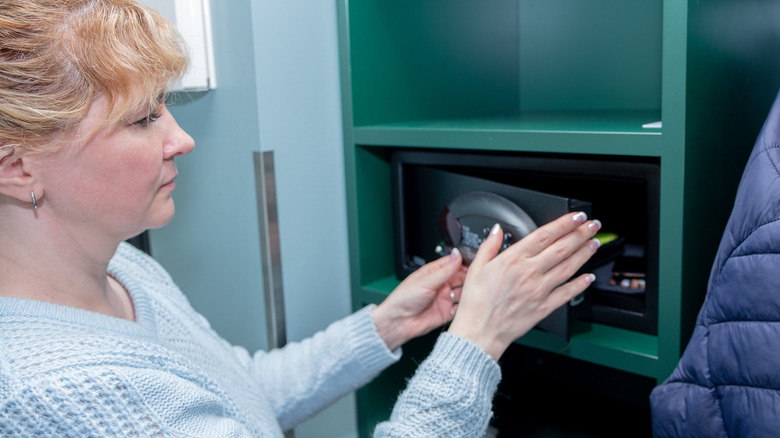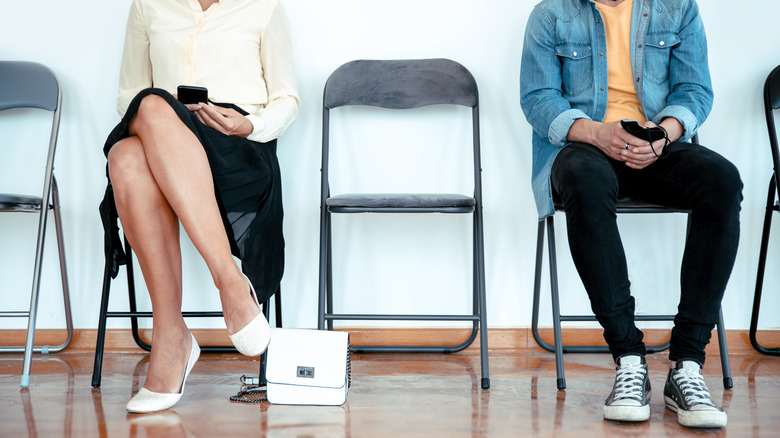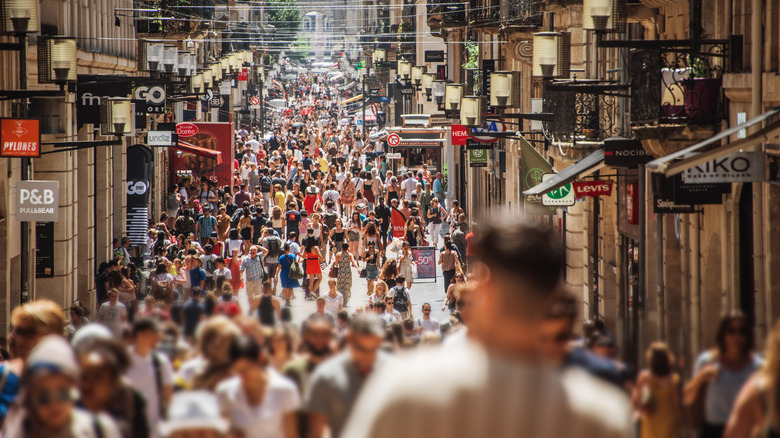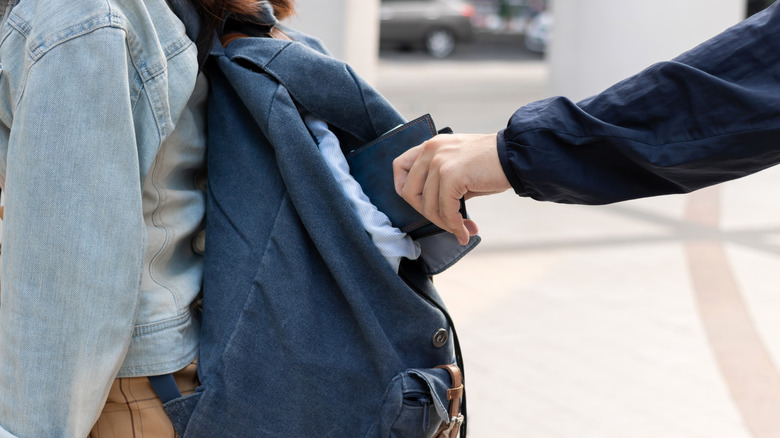Rick Steves' Expert Tips To Not Get Pickpocketed On Your Trip To Europe
We may receive a commission on purchases made from links.
There is a plethora of information online about pickpocketing and petty theft when planning a trip to Europe. Pickpocketing is so prevalent that expert traveler Rick Steves has experienced theft by proxy (his guests, not him) on some of his trips. Despite this, he has only been pickpocketed three times in all his travels, so his anti-pickpocket advice clearly works. The first happened on one unfortunate day in Paris in 2017. Per his blog post, Steves wrote that it was a day he didn't wear his trusted moneybelt.
"Thieves know where the crowds are — and where the tourists are — and they are very, very deft at their work," Steves wrote. "A petite bump and a slight nudge getting off the Métro in Paris and bam — wallet gone ... I went back to the hotel, referred to the emergency section in the appendix of our Paris guidebook, and set about canceling my credit cards. I lost my driver's license, two credit cards, and some money." It comes as no surprise that the incident happened in France, the second most likely place to be pickpocketed, according to data analysis by Quotezone.
How has he managed to elude pickpockets in his many, many adventures across the world? Steves has curated an expert list of ways to avoid being pickpocketed, which he readily shares with fellow travelers. And these just add to all the marvelous travel tips we've learned from Rick Steves.
Always be aware of your surroundings
We know it can be painfully difficult to look away from the Trevi Fountain or the Eiffel Tower. But the best thing you can do for yourself when traveling anywhere is always to be aware of your surroundings. This is especially important in crowds or public transit, since these places are where pickpockets are more likely to strike, according to expert traveler Rick Steves. On one of his blogs, he writes that crowded public transit stops or stations are prime pickpocket territory. After all, it was at a Paris metro where he was pickpocketed for the first time.
"I would just remind our listeners that thieves target American tourists not because they're mean or they don't like us," Steves said on Johnny Jet's travel podcast. "We're just common-sense victims because we've got all the good stuff in our purses and wallets. So you know you're going to get targeted." Keeping your head on a swivel can't guarantee you'll never be pickpocketed, but always knowing who is around you and what they're doing is one way to thwart a would-be pickpocket from taking advantage.
Don't carry valuables
Rick Steves doesn't use in-room hotel safes, though he understands why they're helpful for other travelers. Even so, he habitually leaves his valuables in his hotel rooms rather than risking them on his person in public. He suggests that important items like passports be left in your hotel room for safekeeping, which is something he does when he's out traveling, per his interview with Johnny Jet's travel podcast. Just be strategic with where you leave your things in the room.
"Some travelers leave their passports secured in the room safe while out for the day. Locking valuables in your luggage is a good alternative if there's no safe," Steves wrote on his blog. "Theft from hotel rooms happens, of course, but it's relatively rare — hoteliers are quick to squelch a pattern of theft. That said, don't tempt sticky-fingered staff by leaving a camera or tablet in plain view; tuck your enticing things well out of sight." In lieu of safes and locked luggage, you could also put your items in drawers, closets, or other hidden locations — out of sight, out of mind.
Keep your belongings secure
Beyond leaving your valuables in the hotel room, it's important to be smart with your belongings when you're out and about. That means never placing purses or backpacks unrestrained. If you want to put your bag on the back of a chair, for instance, make sure you hook a strap somewhere else, too, to keep someone from snatching it and running. Per Rick Steves, even something as simple as one extra loop can keep a thief from targeting you — you've made yourself just a little too difficult.
"If you're sitting down to eat or rest, loop your day pack strap around your arm, leg, or chair leg," Steves wrote on his blog. "If you plan to sleep on a train (or anywhere in public), clip or fasten your pack or suitcase to the seat, the luggage rack, or yourself. Most zippers are lockable, and even a twist-tie, paper clip, or key ring is helpful to keep your bag zipped up tight. The point isn't to make your bag impenetrable, but harder to get into than the next guy's." You could also think twice before traveling with a backpack, since it makes you more obviously a tourist.
Another way to keep your items secure is by using a money belt, like Steves does when he's traveling. He highly recommends them, though he warns they'll only be helpful if used correctly. That means fastening them tight around your body, tucking them back in after retrieving things, and not making it obvious you're wearing one by checking it constantly.
Do not go towards crowds or commotions
Related to being more aware in public spaces, it's also a good idea to avoid dense crowds and definitely avoid any commotion you may spot. That's because it may be fabricated as a distraction to make theft victims of onlookers. This is even true of staged incidents that are designed to target you directly. Rick Steves points out on his blog that you may get something like ketchup thrown at you as a way to distract you while a thief moves in. He explains that these kinds of situations aren't uncommon for unsuspecting tourists.
"There are similar schemes: Someone drops something, you kindly pick it up, and you lose your wallet," Steves wrote. "Or someone throws a baby into your arms as your pockets are picked ... If an elderly person falls down an escalator, stand back and guard your valuables, then ... carefully ... move in to help." Steves also warns to be wary of strangers being oddly helpful, like someone wanting to help you use an ATM or trying to tell you how to store your valuables safely.
Don't believe everything you see
Take any notion of what you think a pickpocket might look like and forget it. Travel expert Rick Steves says many pickpockets will get away with it because they don't look like thieves. He writes on his blog that thieves often go to great lengths to present themselves in a way where you'll let your guard down, like wearing a bogus uniform, a nice suit, or even using children to get you to play into their scene. You're better off not trusting strangers who approach you than working on your assumptions and getting robbed. Another travel expert Samantha Brown suggests dressing more like a local to protect yourself against pickpockets.
A pickpocket could even look like you, a tourist. "Some pose as tourists, with day packs, cameras, and even guidebooks," Steves wrote. "Don't be fooled by looks, impressive uniforms, or hard-luck stories." He also added that many beggars are actually thieves, like groups of kids with cardboard signs hoping to distract you long enough for them to take your wallet. And if someone tries to shove something free into your hands, don't take it. Even if it isn't part of some pickpocketing scheme, there's a good chance they'll berate you into giving them money — take that from personal experience.
